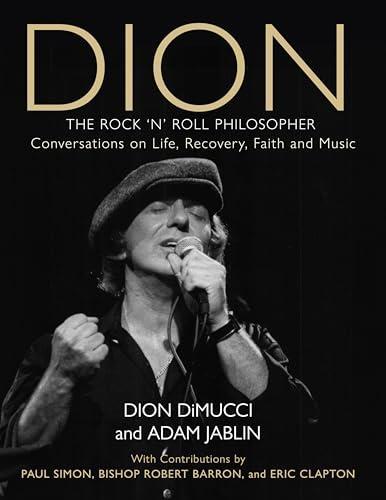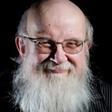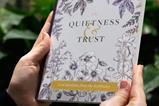Spanning doo-wop fame, personal struggle, enduring love and a deepening Christian faith, Dion: The Rock & Roll Philosopher is more than a glossy fan keepsake – it’s a surprisingly wise and rewarding read, says our reviewer

Even if you know little about popular music, you’ve likely heard of Dion DiMucci.
From his 1950s debut with the Italian American doo-wop group the Belmonts, to his latest album Girl Friends, he has been praised, celebrated, and is now the subject of a Broadway musical that charts his journey from Bronx street life to Grammy-winning fame.
At first glance, this lavishly produced hardback – Dion: The Rock and Roll Philosopher: Conversations on Life, Recovery, Faith and Music (Lyons Press), complete with full-colour photos on almost every spread, might seem like a cash-in artefact for superfans. But as soon as you begin reading Adam Jablin’s text, drawn from dozens (if not hundreds) of conversations with Dion, it becomes clear this is something rarer: a book you can hand to anyone – devout Christian, hardcore atheist or committed rock follower.
There is a wealth of insight in these DiMucci–Jablin conversations. Early on, Dion recalls hearing country pioneer Hank Williams at the age of ten, an experience that shaped his understanding of music’s power: “A singer-songwriter understands the power of song – both real and symbolic – its emotional connection to the listener. A rock ’n’ roll song… awakens the forces of their imagination.” As a boy he learned 40 of Williams’s songs, and just a few years later, as a teenager, formed the Belmonts before stepping into solo fame.
One of Dion’s biggest hits, his 1964 classic ‘The Wanderer’, portrays a promiscuous youth roaming from town to town, capturing the hearts of dozens of women. “I roam from town to town / I go through life without a care / And I’m as happy as a clown / With my two fists of iron but I’m going nowhere.” Dion reflects: “Most people think my song ‘The Wanderer’ is about a cool guy… but basically, it’s about a jerk. Usually, a clown isn’t happy. He’s a thin veneer of a man.” In another chapter he observes: “Some guys grow old but they never grow up.”
His thoughts on rock and pop stardom are striking: “The spotlight has a strange effect on people, it’s like a narcotic. People are not meant to be worshipped.”
Elsewhere he recalls a two-hour conversation with Paul Simon about spirituality, life and music, where they reflected on how essential it is for perceptions and belief systems to translate into action.
Dion talks about his beloved wife, Susan. He met her at 17 when she was 15 and was immediately smitten, even writing a song for her ‘Runaround Sue’ – which became his first solo hit after leaving the Belmonts. Their marriage has lasted for more than 60 years, though his recording contract with Columbia Records did not. In 1968 the label refused to release his completed Kickin’ Child album. By then, his life was in turmoil. One of his closest friends, Frankie Lymon of the Teenagers – the Black doo-wop pioneers who had once roamed the New York streets with Dion – died that year of a heroin overdose. Dion too was regularly using the drug. But Susan persuaded him to attend a recovery programme, through which he broke free from heroin’s poisonous grip. His nominal Catholicism also blossomed into a life-transforming faith. In the early 1970s he recorded four gospel albums, including the classic The Truth Will Set You Free.
One recurring theme of the book is the importance of relationships. Dion explains: “If my relationship is off with you, or her, or that guy, I can’t perform on my own. When I’m right with God, everyone gets the benefit of it. When I’m right with him, my wife gets the benefits, my daughters get the benefits, my fans and my music get the benefits… It’s not who I am – it’s WHOSE I am.”
One particularly inspiring chapter is ‘How I Learned’, where Dion names 83 people who shaped him and notes what each taught him. I was especially struck by the range – from musical giants to spiritual mentors to family. Hank Williams taught him: “how to communicate”; Little Richard showed him: “what free abandon means”; and Bob Dylan pushed him to see that: “thinking wasn’t rearranging my prejudices.” The voices of faith leaders also resonate: Bishop Robert Barron helped him see the value of detachment from: “wealth, pleasure, power and honour,” while Monsignor Joseph Perricone showed him: “that the virtuous man was a happy man.” And amid all these influences, it was Susan, his wife of six decades, who gave the lesson he treasures most: “I learned how to love and be thoughtful.”

When I first read this book, I rated it four stars – but on a second reading, I feel it only merits three. The main issue lies its fragmented structure. Of its 48 chapters, several are simply lists – and not particularly interesting ones. Co-author Adam Jablin, described as: “a renowned life and performance coach and keynote speaker,” proves less effective as an editor or compendium compiler.
Some of Dion’s chapters on fellow travellers on the rock’n’roll road of fame are insightful such as his reflection on Lou Reed. But sometimes they are unwittingly sentimental. Like the one on Sam Cooke with whom Dion toured in the 60s. It’s simply not true to say Sam Cooke was: “living out the gospel”. Yes, he was a courageous confronter of racism. But Cooke’s life of extreme sexual immorality (documented in more than one biography) showed that Dion’s view of the African American singing star is myopic.
Moreover, some of the book’s lists are easy to nitpick. In the Top 12 Doowop Songs, for instance, “Be My Baby” by the Ronettes isn’t a doowop song. And some of the lists are downright indulgent – taking three A4 pages to make the point that we all need to develop gratitude by listing various household items, number one being “refrigerator”, number 26 “a credit card” and number 46 “sprinklers”, is over the top. Maybe this is an example of where lavish hardback book design – with, in my opinion, far too many photos – can end up.
It’s still worth a read if you’re a big fan with £40 to spare – but it’s a shame it falls short of being a classic.







































1 Reader's comment